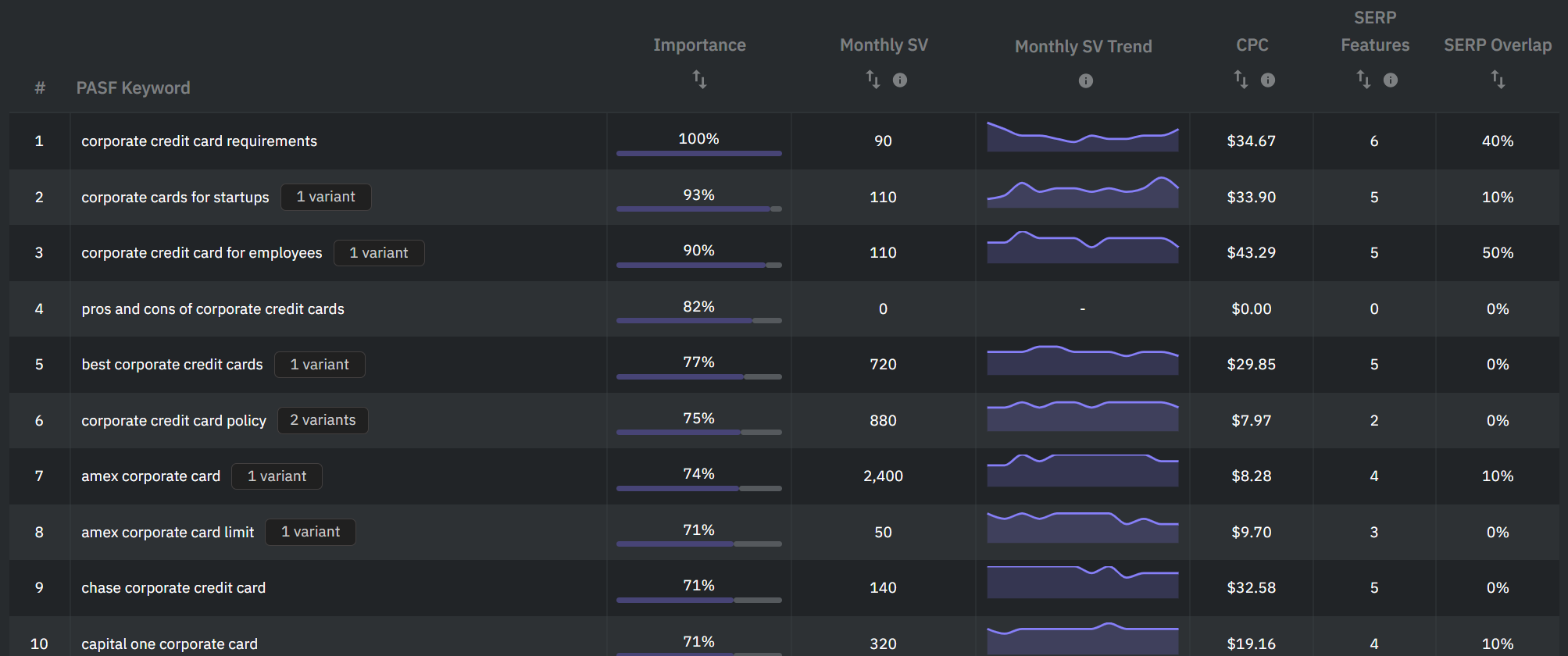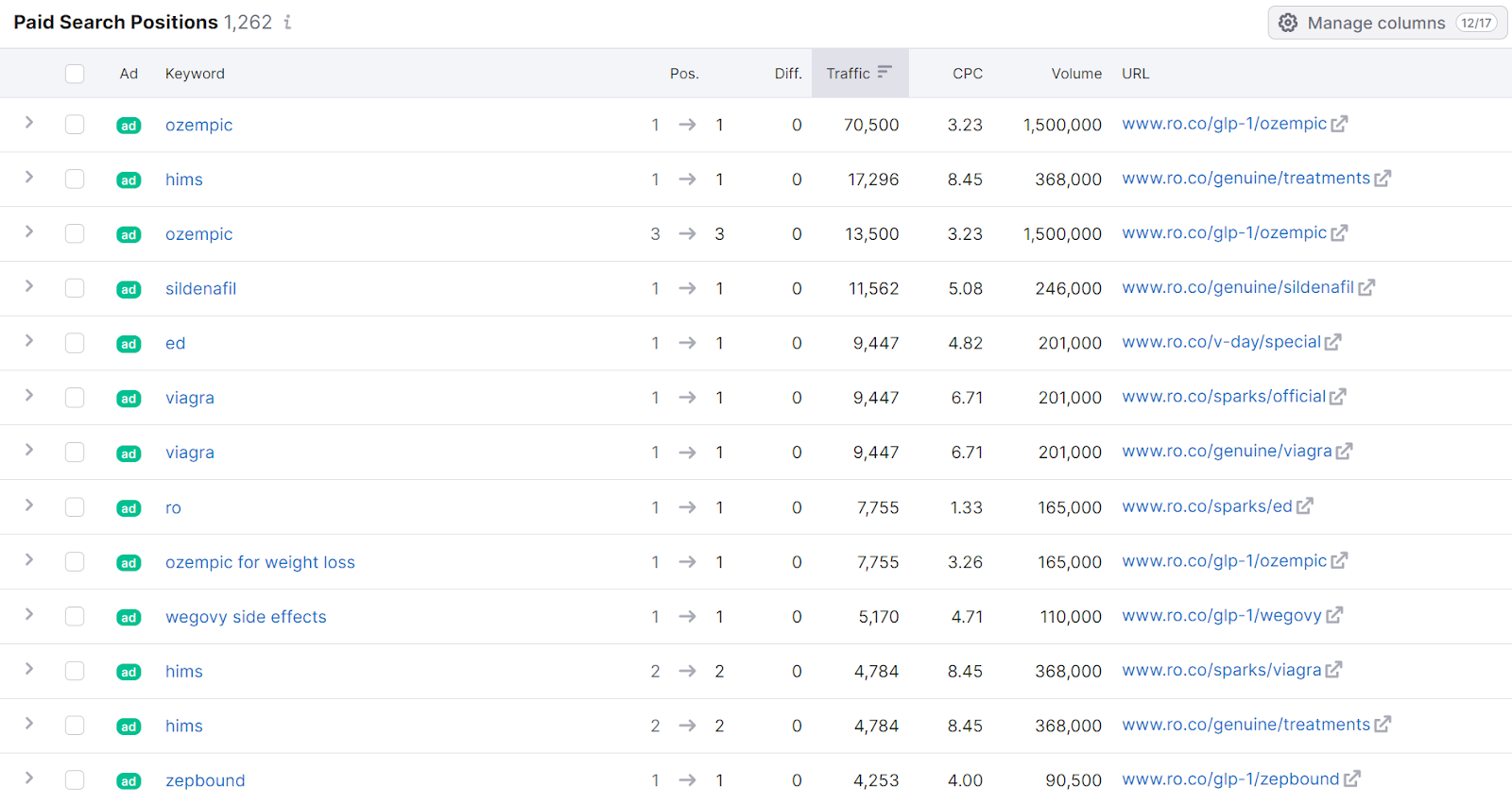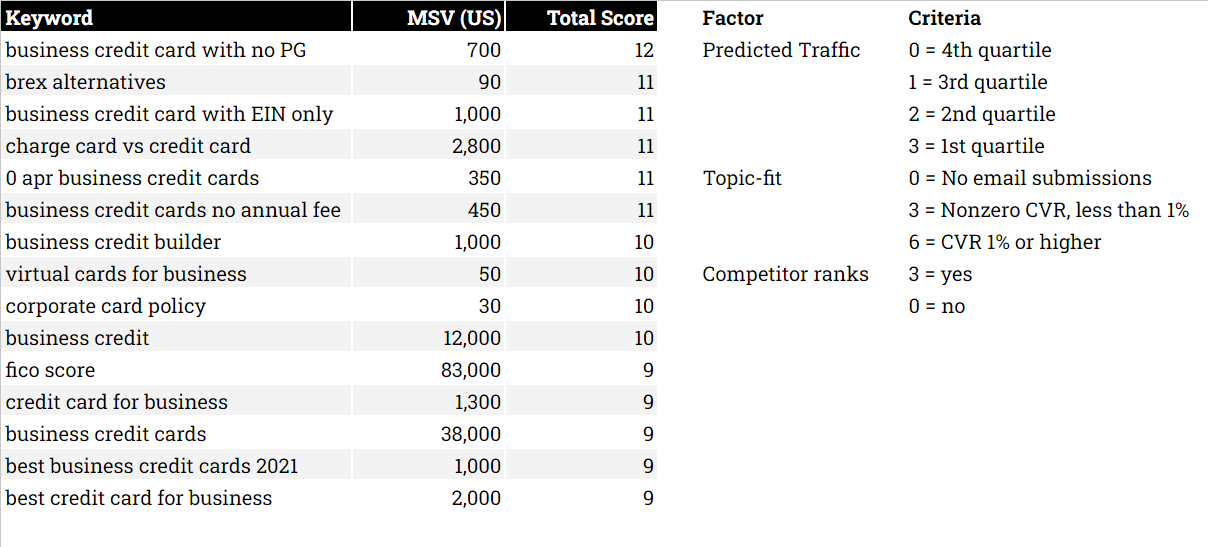Boost your skills with Growth Memo’s weekly expert insights. Subscribe for free!
The classic approach to keyword research is outdated. Instead of doing a sprint every so often, build a keyword universe to explore and conquer.
To Infinity And Beyond
A Keyword Universe is a big pool that surfaces the most important keywords at the top and lives in a spreadsheet or database like BigQuery.
 Image Credit: Kevin Indig
Image Credit: Kevin IndigThe goal is a keyword pipeline for content creation prioritized by business impact.
Keyword Universes elevate the most impactful topics to the top of a list, which allows companies to focus on planning capacity, like the number of published articles.
 Image Credit: Kevin Indig
Image Credit: Kevin IndigA big problem in SEO is knowing which keywords convert to customers before targeting them. The Keyword Universe mitigates that problem through a clever sorting system.
One big advantage of the Keyword Universe compared to research sprints is that new keywords automatically fall into a natural prioritization.
SEOs can continuously research and launch new keywords into the universe, while writers can pick keywords off the list at any time. Fluid collaboration.
 Image Credit: Kevin Indig
Image Credit: Kevin IndigKeyword Universes are mostly relevant for companies that have to create content themselves instead of leaning on users or products. I call them Integrators. Typical culprits are SaaS, DTC, or publishing businesses, which have no pre-determined structure for keyword prioritization.
The opposite is Aggregators, which scale organic traffic through UGC or product inventory.
Examples are TripAdvisor, Uber Eats, TikTok, and Yelp. The keyword path for Aggregators is defined by their page types. The target topics come out of the product.
Yelp, for example, knows that “near me keywords” and query patterns like “{business} in {city}” are important because that’s the main use case for their local listing pages.
Integrators don’t have that luxury. They need to use other signals to prioritize keywords for business impact.
Galaxy Builder
Building a Keyword Universe is a three-step process:
Step 1: Mine
Keyword mining is the science of building a large list of keywords and a bread-and-butter workflow in SEO. The classic way is to use a list of seed keywords and throw them into third-party rank trackers to get related terms and other suggestions. That’s a good start.
But don’t ignore other valuable sources of keyword ideas:
- Customer conversations: terminology and topics brought up by customers.
- SERP features like PAAs and Google Suggest.
- Search Console: keywords Google tries to rank but doesn’t have the right content have high impressions but low clicks.
- Competitor ranks and paid search keywords.
 People Also Search For feature in Search Response (Image Credit: Kevin Indig)
People Also Search For feature in Search Response (Image Credit: Kevin Indig) Semrush’s list of paid keywords a company bids on (Image Credit: Kevin Indig)
Semrush’s list of paid keywords a company bids on (Image Credit: Kevin Indig)The goal of the first step is to bloat our Universe with as many keywords as we can find. Don’t obsess over relevance. That’s Step 2.
Step 2: Align
Step 2, sorting the long list of keywords, is the linchpin of Keyword Universes. Getting it right is installing a powerful prioritization system for your company. Getting it wrong is wasting time. Anyone can create a large list of keywords, but creating strong filters and sorting mechanisms is hard.
The old-school way to go about prioritization is by search volume. We can do better than that. Most times, keywords with higher search volume actually convert less well.
Since we don’t know which keywords are most important for the business before targeting them, we need sorting parameters based on strong signals.
We can summarize several signals for each keyword and sort the list by a total score. That’s exactly what I’ve done with clients like Ramp, the fastest-growing fintech startup in history, to prioritize content strategy.
 Real example of a Keyword Universe (Image Credit: Kevin Indig)
Real example of a Keyword Universe (Image Credit: Kevin Indig)Sorting is about defining an initial set of signals and then refining it with feedback. We start by giving each signal a weight based on our best guess and refine it over time.
Potential signals (not all need to be used):
- MSV (monthly search volume).
- KD (keyword difficulty) / competitiveness.
- (MSV * KD) / CPC → I like to use this simple formula to balance search demand with competitiveness and potential conversion value.
- Traffic potential.
- Conversions from paid search or other channels.
- Keyword is mentioned in customer conversation.
- Keyword is part of a topic that converts well.
- Growing or shrinking MSV.
- Query modifier indicates users are ready to take action like “buy” or “download.”
We give each signal a weight from zero to 10 or zero to three, with the highest number being strongest and zero being weakest. The sum of all scores determines the sorting of the list. Keywords with the highest total score land at the top and vice versa. New keywords on the list fall into a natural prioritization.
Step 3: Refine
Models get good by improving over time. Like an LLM that learns from fine-tuning, we need to adjust our signal weighting based on the results we see. We can go about fine-tuning in two ways.
Anecdotally, conversions should increase as we build new content (or update existing content) based on the Keyword Universe. Otherwise, sorting signals have the wrong weighting, and we need to adjust.
Another way to test the system is a snapshot analysis: a comparison of the keywords that attract most organic clicks to the pages that drive the most conversions with the keywords at the top of the Universe. Ideally, they overlap. If they don’t, aim to adjust your sorting signals until they come close.
Tips
1. It’s easy to lose overview when mixing keywords that led to new content with keywords that haven’t yet. Move keywords that were written about to a different list and monitor ranks in a third-party rank tracker when operationalizing the Keyword Universe. I suggest a second tab on a spreadsheet or another table in a database.
2. Build custom click curves for each page type (blog article, landing page, calculator, etc.) when including traffic and revenue projections. Assign each step in the conversion funnel a conversion rate, like visit → sign-up, and multiply search volume with an estimated position on the custom click curve, conversion rates, and lifetime value. Fine-tune regularly.
Example: MSV * CTR (pos 1) * CVRs * Lifetime value = revenue prediction
3. GPT for Sheets or the Meaning Cloud extension for Google Sheets can speed up assigning each keyword to a topic. Meaning Cloud allows us to easily train an LLM by uploading a spreadsheet with a few tagged keywords. GPT for Sheets connects Google Sheets with the OpenAI API so we can give prompts like “Which of the following topics would this keyword best fit? Category 1, Category 2, Category 3, etc.”
Worldviews
Having the right filter is not just a concept for SEO but for life. Our sorting signals are worldviews, principles and values shaped by experience.
Prioritizing what’s important (sorting) allows us to literally filter through the noise (distractions, offers, shiny objects) and bring us to where we want to be. But they can’t improve without fine-tuning with feedback.
For a long time, I operated with the filter that managing a lot of people was the optimal way to respect and money.
Turns out, it’s really not. But it took me years and a few painful lessons to come to that realization.
Those lessons and reflecting on them are the feedback mechanisms that help me fine-tune my filter and define better priorities, just like adjusting the weight of sorting signals in our Keyword Universe surfaces better target keywords.
The key to using signals is being aware of which signals impact our decisions and using feedback to fine-tune them.
Featured Image: Lyna ™





![AI Overviews: We Reverse-Engineered Them So You Don't Have To [+ What You Need To Do Next]](https://www.searchenginejournal.com/wp-content/uploads/2025/04/sidebar1x-455.png)